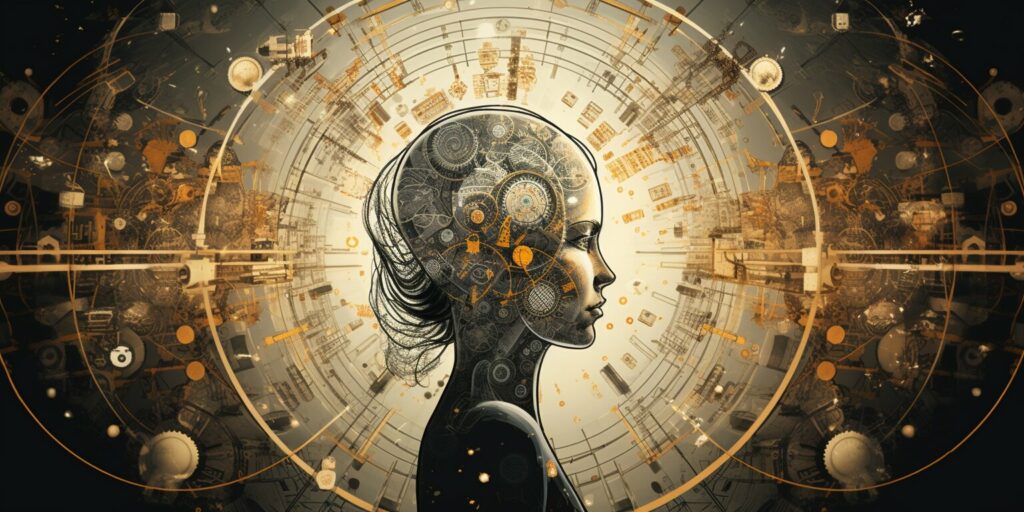Consciousness in psychology is a fascinating and complex subject that has intrigued researchers for decades. It refers to our awareness of ourselves and the world around us, encompassing our thoughts, feelings, perceptions, and experiences. Understanding consciousness is crucial in gaining insight into human cognition and behavior.
One way to define consciousness is as a state of mind that allows us to have subjective experiences and be aware of them. It involves being conscious of our own mental processes, such as thoughts, emotions, and sensations. Consciousness also includes being aware of external stimuli from the environment.
Exploring consciousness in psychology involves delving into various theories and perspectives. From Sigmund Freud’s psychoanalytic approach to contemporary cognitive neuroscience research, there are diverse viewpoints on how consciousness emerges and functions within the human mind.
In this article, I’ll delve deeper into the concept of consciousness in psychology, exploring its different dimensions and discussing some prominent theories that shed light on this intriguing aspect of human experience. We’ll explore topics such as altered states of consciousness, levels of awareness, and the role that attention plays in shaping our conscious experiences.
Join me on this journey as we unravel the mysteries surrounding consciousness in psychology and gain a deeper understanding of what it means to be conscious beings.
The Definition of Consciousness in Psychology
When it comes to understanding consciousness in the field of psychology, there is no single, universally accepted definition. It is a complex and multifaceted concept that has intrigued philosophers, scientists, and psychologists for centuries. In simple terms, consciousness refers to our awareness of ourselves and the world around us.
One way to define consciousness is as a state of being awake and aware of one’s surroundings. It encompasses our ability to perceive information through our senses, such as seeing, hearing, tasting, smelling, and touching. This aspect of consciousness allows us to interact with the external environment and process sensory inputs.
However, consciousness goes beyond mere wakefulness. It also involves higher-order cognitive processes such as attention, memory, reasoning, problem-solving, and self-reflection. These mental activities contribute to our sense of self-identity and enable us to engage in introspection and reflect on our thoughts and emotions.
Another dimension of consciousness is subjective experience or qualia. This refers to the individual’s unique first-person perspective on their own conscious states. For instance, the taste of chocolate or the feeling of joy are subjective experiences that cannot be fully grasped by others but are deeply meaningful for the person experiencing them.
It’s important to note that while psychologists strive to study consciousness empirically using various research methods like neuroimaging techniques or behavioral experiments; it remains a complex phenomenon that eludes complete understanding. The elusive nature of consciousness continues to fuel ongoing debates within psychology about its origin, nature, and potential role in shaping human behavior.
In summary, pinpointing an exact definition for consciousness in psychology proves challenging due to its multi-faceted nature involving wakefulness, higher-order cognitive processes, subjective experience, and ongoing scientific inquiry. By delving into these different aspects, we can begin unraveling this intriguing phenomenon and gain deeper insights into what makes us uniquely human.
The Study of Consciousness
The study of consciousness is an intriguing and fundamental aspect of psychology that holds significant importance. Exploring the complexities and mysteries of human consciousness allows us to gain valuable insights into how our minds work, how we perceive the world around us, and how we experience our own existence.
One key reason why studying consciousness is essential is its direct relevance to understanding human behavior. By investigating different states of consciousness, such as wakefulness, sleep, and dreaming, and altered states, like meditation or hypnosis, psychologists can unravel the underlying mechanisms that shape our thoughts, emotions, and actions. This knowledge not only helps us comprehend individual experiences but also contributes to developing effective therapeutic interventions for mental health disorders.
Furthermore, exploring consciousness enables us to delve deeper into the nature of subjective experience itself. It raises profound philosophical questions about the self, free will, and the relationship between mind and body. By examining various theories and perspectives on consciousness from both scientific and philosophical angles, we can broaden our understanding of what it means to be conscious beings.
Studying consciousness also has practical implications in areas such as education, decision-making processes, and even artificial intelligence development. Understanding how attention works or how our awareness influences learning can inform teaching strategies that optimize cognitive engagement in educational settings. Additionally, investigating decision-making processes at a conscious level helps in comprehending biases or cognitive limitations that might impact choices made by individuals or groups.
In the end, studying consciousness unlocks a treasure trove of knowledge about ourselves as sentient beings. It provides invaluable insights into the depths of human cognition while addressing existential questions about our place in the universe. The importance of studying this enigmatic phenomenon lies not only in enhancing psychological understanding but also in its potential applications across various domains that shape human experience. So let’s embark on this fascinating journey together – one that promises to challenge our preconceptions while illuminating the intricacies of our own minds.
Different Theories on the Nature of Consciousness
When it comes to understanding consciousness in psychology, there are a variety of theories that attempt to shed light on its nature and workings. Let’s delve into some of these theories:
- Dualism: One prominent theory is dualism, which suggests that consciousness is separate from the physical body. According to this view, the mind and body are distinct entities, with consciousness being non-physical or spiritual in nature. This theory has roots in ancient philosophical traditions and continues to be debated by modern scholars.
- Materialism: In contrast to dualism, materialism proposes that consciousness arises solely from physical processes within the brain. Advocates of this theory argue that everything we experience can ultimately be understood through the lens of neuroscience and cognitive science without invoking any metaphysical elements.
- Functionalism: Another theory worth considering is functionalism, which focuses on how consciousness functions rather than its underlying substance. Proponents of this perspective suggest that what matters most is not what our conscious experiences are made of but rather how they contribute to our overall mental functioning and behavior.
- Integrated Information Theory (IIT): Developed by neuroscientist Giulio Tononi, IIT posits that consciousness arises from the integration of information within a complex system. According to this theory, a highly interconnected network capable of processing diverse types of information gives rise to subjective experiences.
- Higher-Order Theories: These theories propose that consciousness emerges through higher-order representations or thoughts about one’s own mental states. They suggest that awareness requires not only sensory input but also self-referential cognition—an ability to reflect upon one’s own thoughts and experiences.
It’s important to note that these theories represent different perspectives on the nature of consciousness and are subject to ongoing debate and refinement within the field of psychology. While each offers valuable insights into understanding human experience, none provides a comprehensive explanation for all aspects of consciousness.
By exploring these various theories, researchers aim to deepen our understanding of consciousness and unlock its mysteries. As the field continues to evolve, new perspectives may emerge, providing fresh insights into this enigmatic phenomenon that lies at the heart of human experience.
Exploring Altered States of Consciousness
Let’s dive into the fascinating realm of altered states of consciousness. These are unique and temporary shifts in our awareness that can be induced by various factors such as meditation, hypnosis, psychedelic substances, or even sleep deprivation. In this section, we’ll explore a few examples of altered states and their potential effects on our perception and cognition.
One prominent example of an altered state is the experience induced by psychedelic substances like LSD or psilocybin mushrooms. When consumed in proper settings, these substances can lead to profound changes in perception, thinking patterns, and emotions. Users often report vivid hallucinations, intensified sensory experiences, and a sense of interconnectedness with everything around them. Research suggests that psychedelics may have therapeutic potential for treating conditions like depression and post-traumatic stress disorder (PTSD).
Another well-known altered state is achieved through deep meditation practices. By cultivating focused attention and mindfulness, meditators can enter states characterized by heightened awareness and tranquility. This altered state allows individuals to detach from their thoughts and observe them without judgment. Studies have shown that regular meditation can enhance cognitive abilities such as attention span, emotional regulation, and creativity.
Hypnosis is yet another intriguing method for inducing an altered state of consciousness. During hypnosis sessions guided by a trained professional, individuals become highly receptive to suggestions while maintaining a relaxed state of mind. Hypnosis has been used therapeutically to address various issues like smoking cessation or managing chronic pain.
Sleep deprivation also alters our conscious experience significantly. When we don’t get enough sleep over an extended period, it affects our cognitive functions, such as memory consolidation, decision-making skills, emotional stability, and overall alertness. The resulting sleep-deprived state can lead to impaired judgment and increased risk-taking behavior.
These examples only scratch the surface when it comes to exploring altered states of consciousness—a vast territory with endless possibilities for investigation. Whether it’s through psychedelic substances, meditation, hypnosis, or sleep deprivation, these altered states offer us glimpses into the mysteries of our own minds. By studying and understanding these phenomena, we can gain valuable insights into the nature of consciousness itself.
Consciousness and Perception
Consciousness and perception are intertwined in the realm of psychology, as our understanding of the world is shaped by these fundamental cognitive processes. Let’s explore this fascinating relationship further.
- Awareness and Sensation:
Consciousness allows us to be aware of our surroundings and internal states, while perception enables us to make sense of the sensory information received from the environment. It’s like a dance between our mind and the external world, where we constantly process incoming stimuli through our senses – sight, sound, touch, taste, and smell. - Selective Attention:
One intriguing aspect of consciousness is selective attention. Our minds filter out irrelevant information to focus on what is most salient or important at any given moment. For instance, imagine being in a crowded café with multiple conversations taking place simultaneously. Your ability to tune out irrelevant noise and concentrate on one specific conversation reflects your conscious control over perception. - Perceptual Organization:
Perception goes beyond mere sensation; it involves organizing sensory input into meaningful patterns and structures. Through perceptual organization, we can recognize objects, faces, shapes, colors, and textures that make up our visual world. This process allows us to navigate our environment effectively. - Perception’s Role in Decision-Making:
Our perceptions greatly influence how we interpret events and make decisions based on available information. For example, if you perceive an approaching dog as threatening due to past experiences or cultural conditioning, your behavioral response may be different compared to perceiving it as friendly or harmless. - Altered States of Consciousness:
Exploring altered states of consciousness sheds light on how perception can be altered under certain conditions, such as meditation or drug-induced experiences. These altered states provide unique insights into the nature of consciousness itself and offer opportunities for self-exploration and personal growth.
Understanding the intricate connection between consciousness and perception opens doors to unraveling complex psychological phenomena related to cognition, learning, memory formation, emotions, and even mental disorders. As we delve deeper into these topics, we’ll gain a richer understanding of the human mind and its remarkable capabilities. Stay tuned for more insights into our ongoing exploration of consciousness in psychology.
The Role of Attention in Consciousness
When it comes to understanding consciousness, attention plays a crucial role. It serves as a filter that helps us selectively focus on certain aspects of our experience while disregarding others. By directing our attention, we are able to bring certain thoughts, sensations, or stimuli into our conscious awareness.
One example that highlights the role of attention in consciousness is the phenomenon known as “selective attention.” Imagine being in a crowded café, where multiple conversations and background noise fill the air. Despite all the auditory input bombarding your ears, you’re able to tune in and have a meaningful conversation with a friend at your table. This ability to focus on one conversation while filtering out the rest demonstrates how attention shapes our conscious experience.
Another interesting aspect of attention’s role in consciousness is its connection to perception. Our ability to perceive and interpret the world around us relies heavily on where we direct our attention. For instance, if you were asked to count how many red cars pass by during your morning commute, you would naturally become more attuned to noticing red cars specifically. This heightened attention increases the likelihood of perceiving red cars and influences your conscious perception of them.
Furthermore, studies have shown that sustained attention is crucial for maintaining conscious awareness over time. When we engage in tasks requiring prolonged concentration, such as reading a book or solving complex problems, our focused attention sustains our conscious state throughout these activities.
In summary, attention acts as a gateway to consciousness by selectively allowing certain information into our awareness while excluding irrelevant stimuli. It governs what we perceive and shapes how we experience the world around us. Understanding the pivotal role of attention provides valuable insights into unraveling the mysteries surrounding human consciousness.
Consciousness and Memory Processes
When it comes to understanding the intricate workings of the human mind, consciousness and memory processes play a crucial role. These two elements are closely intertwined, as our conscious experiences often rely on our ability to retrieve information from our memory banks. Let’s delve deeper into how consciousness and memory interact.
- Retrieval of Memories: Our consciousness allows us to access memories stored in different parts of our brain. Whether it’s recalling a cherished childhood moment or remembering an important piece of information for an exam, our conscious awareness enables us to retrieve these memories from the vast sea of knowledge within us.
- Encoding and Consolidation: Consciousness also plays a pivotal role in the initial encoding and consolidation of memories. When we are consciously engaged with something, whether it’s learning new skills or absorbing new information, we tend to have better retention compared to when we are not fully present or paying attention.
- Awareness of Self: Another intriguing aspect is that consciousness provides us with self-awareness—the ability to perceive ourselves as separate entities with unique identities. This self-awareness influences how memories are formed and processed, as we often store information based on its relevance to our personal experiences and sense of identity.
- Altered States of Consciousness: Exploring altered states of consciousness can shed light on the fascinating relationship between consciousness and memory processes. For example, during sleep or hypnosis, our level of conscious awareness shifts, leading to variations in how memories are accessed or formed.
- The Role of Emotions: Emotions also intertwine with both consciousness and memory processes. Emotional events tend to be remembered more vividly due to their heightened impact on our conscious experience. Conversely, certain emotional states can influence our level of conscious awareness, potentially affecting memory retrieval.
Understanding the intricate dynamics between consciousness and memory processes is crucial for unraveling the mysteries surrounding human cognition and behavior. By exploring this relationship further through research and experimentation, psychologists can gain valuable insights into how our minds store, retrieve, and process information.
Understanding Self-Consciousness in Psychology
Self-consciousness is a fascinating aspect of human psychology that involves being aware of oneself as an individual with thoughts, feelings, and experiences. In this section, I’ll delve into the concept of self-consciousness and its significance in the field of psychology. Let’s explore three examples that shed light on this intriguing phenomenon.
- Self-Reflection: One prominent aspect of self-consciousness is the ability to reflect upon oneself. We all engage in introspection from time to time, pondering our actions, beliefs, and emotions. This process allows us to gain insights into our own behavior and make sense of our experiences. Whether it’s contemplating past decisions or examining personal values, self-reflection plays a crucial role in understanding ourselves better.
- Social Comparison: Another interesting facet related to self-consciousness is social comparison. Humans have a natural tendency to compare themselves with others as a way to evaluate their own worth or abilities. This can be both positive and negative, depending on the context. For instance, comparing oneself to someone more successful might inspire motivation for personal growth; however, constant comparisons leading to feelings of inferiority can negatively impact well-being.
- Self-awareness: Self-awareness is at the core of self-consciousness and refers to recognizing one’s existence separate from others and having knowledge about one’s own mental states and characteristics. It involves being attuned to one’s emotions, thoughts, desires, strengths, weaknesses, and values. Developing self-awareness enables individuals to navigate life more effectively by aligning their behaviors with their authentic selves.
These are just a few examples that highlight the multifaceted nature of self-consciousness within psychology. By understanding how we perceive ourselves and relate to others socially, researchers can gain greater insight into human behavior and contribute valuable findings toward promoting psychological well-being.
In summary, self-consciousness encompasses various components such as self-reflection, social comparison, and self-awareness. Exploring these aspects helps us comprehend the intricacies of human psychology and provides a deeper understanding of ourselves as individuals in relation to our surroundings and interactions with others. As we continue to unravel the complexities of consciousness, it becomes clear that self-consciousness plays a pivotal role in shaping our thoughts, emotions, and behaviors.



